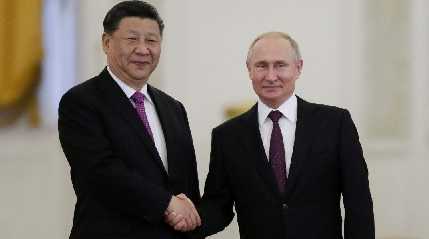
by Iftikhar Gilani
While elections in South Korea, the Philippines, Malaysia, Australia, Hong Kong, Brazil, Hungary, Angola, Kenya, Italy and France will dominate the global political scene in 2022, the developments associated with heightened tensions between China and the US to claim geostrategic space will consume much of global attention over the next 12 months.
Analysts believe the rivalry between the two superpowers is expected to play out in everything from trade to tech regulation, vaccinations to space stations. While in the US, President Joe Biden will face midterm elections, where all 435 seats in the House of Representatives and 34 of the 100 seats in the Senate will be contested, in Beijing, his Chinese counterpart, Xi Jinping, will steer the 20th Congress of Communist Party.
The 19th Congress met in 2017, which ratified changes to the constitution of the Chinese Communist Party, and also elected leaders to various top decision-making bodies.
Although the coronavirus pandemic will continue to pose a challenge with new varieties dampening hopes that the virus would be defeated soon, the world is now adjusting to adapt and repair the damages done by the virus.
All eyes will be on the Education Summit scheduled in September 2022, where global leaders will discuss the ways to provide children and young people with innovative and effective education, keeping in view that this sector was badly affected due to COVID-19.
According to the Organisation for Economic Cooperation and Development report published last year in September, the disruption to education was severe and is likely to cast long shadows over the economic and social well-being of people of all ages.
In October, Indonesia will host the G20 Summit, bringing together the world's largest economies. The Indonesian government has announced priorities for its G20 rotating presidency — global health architecture, digital economy transformation, and energy transition. The decisions taken at the G20 will form the cornerstone to shape a comprehensive strategy for post-pandemic recovery.
Geostrategic rivalry shifts to Indo-Pacific
In June 2022, the UN General Assembly will organise the Stockholm plus 50 Conference, co-hosted by Sweden and Kenya, in the Swedish capital of Stockholm. The Conference will draft a plan for improving the health of the planet and safeguarding natural resources after holding consultations and discussions with individuals, communities, organisations, and governments around the world. The meeting will commemorate the 50 years since the 1972 UN Conference on the Human Environment, which made the environment a pressing global issue for the first time.
According to Raffaello Pantucci, a senior fellow at the Rajaratnam School of International Studies in Singapore, the course of relations between the US and China will remain the most significant geopolitical dynamic in 2022. While the West may not have completely withdrawn from the Middle East and will continue to monitor developments in Afghanistan, the US has certainly shifted its focus toward the Indo-Pacific to combat challenges posed by China.
Analysts believe that developments related to Russia-China ties will remain most sought after this year. Unlike in the past, Moscow and Beijing are heading to keep their differences aside for greater strategic cooperation against the West.
"In 2022, our countries will celebrate the Chinese-Russian Year of Sports and we will write a new page in the history of friendship between the two countries, passed down from generation to generation," said a post on the Chinese Foreign Ministry website quoting President Xi recently.
In India, the provincial elections to choose assemblies in five states, more particularly in the northern state of Uttar Pradesh in March, will be crucial to decide the future political course in the country.
Crucial test for Indian politics
Sumit Ganguly, author and columnist at Foreign Affairs — an American journal dedicated to international relations — said given that Uttar Pradesh enjoys the largest number of seats in both houses of India's parliament, maintaining control over the state's legislature remains a critical imperative for Prime Minister, Narendra Modi. The state hosts a population of around 241 million, with 43.9 million or 19.3 per cent Muslims.
The significance of these elections stems from the fact that this largest populated state in India is headed by Chief Minister, Yogi Adityanath, a Hindu priest, who is believed to have turned it into a lab of Hindu extremist politics.
"Instead of focusing on socio-economic development, he (Adityanath) has spent the bulk of his energy demonising Muslims and other minorities, building Hindu temples while caricaturing previous governments for ostensibly pampering Muslims, and squandering the state's limited revenues on populist schemes, even as the state faces significant budgetary shortfalls," said Ganguly.
According to Christopher Sabatini, a senior research fellow at the British think tank Chatham House, the polls in Brazil and Colombia scheduled in 2022 will be watched with keen interest, as many countries in the region have recently rejected incumbent governments.
Last, but not least, the Winter Olympics in Beijing and the football World Cup in Qatar will hog the limelight in 2022, as big sporting events have tendencies to end up being political.
For hosting the global football competition, tiny energy-rich Gulf state of Qatar has spent an estimated $220 billion on facilities and infrastructure since it was awarded the host-nation status in 2010.
This content was published in Middle East Monitor on January 07, 2022. To restrict the overall size; some images may have been excluded.
Opinions expressed in this article are the author's own and do not necessarily reflect the views of UMMnews.




